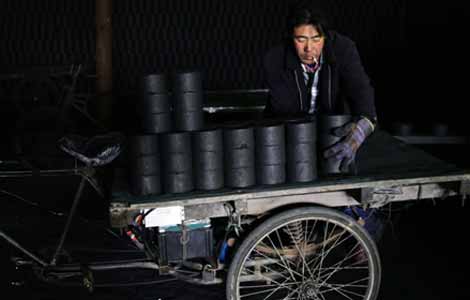Rescuers work in Tacloban
Updated: 2013-11-25 00:22
By ZHANG YUNBI in Tacloban, the Philippines and Zhang fan in Beijing (China Daily)
|
||||||||
Chinese aid arrives as Philippine city struggles to recover
"One, two, three ..." Six of the 30 Chinese rescuers lifted supporting pillars and took only half an hour to build a medical-camp tent in the front courtyard of Tacloban City Hall.
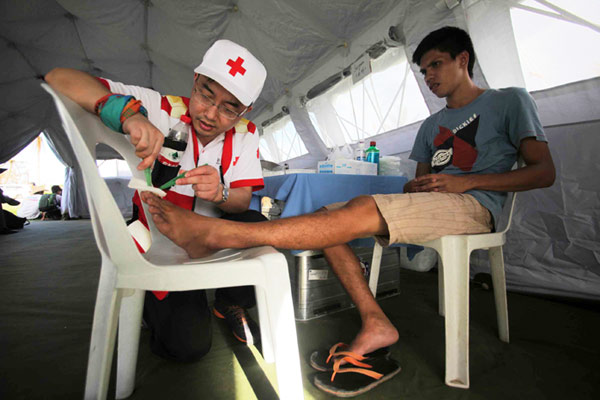 |
|
A doctor with the Red Cross Society of China international rescue team treats Keith Villamor, the first visitor to the team's medical camp in Tacloban, in the Philippines, on Sunday. Wang Jing / China Daily |
The Red Cross Society of China's international medical team started to assemble their first medical camp on Sunday in the devastated coastal Philippine city of Tacloban, and the city is showing signs of life after the wreckage inflicted by Typhoon Haiyan.
Scanners, medicine and surgical equipment were soon put in place with a clear layout design in the tent.
"This is the first medical rescue operation overseas of the Red Cross Society of China in the past 90 years. The medical center here is concentrating on trauma injuries, pregnant women and children," said Peng Bibo, medical director of the Chinese team.
The first visitor to the camp was Keith Villamor, a 20-year-old employee of Robinsons Department Store who suffered a severe infection in a toe.
The local capacity now is still "far from meeting the demand" of residents, Villamor said, thanking the team for treating his toe.
"I hope more help comes from countries like China," he added.
The Chinese naval medical ship, the Peace Ark, arrived in the area, which has sanitation problems, a lack of water and power supply, and many homeless residents.
"China may not have been there on the first day (after the typhoon), ... but it is fast gearing up its own massive outpouring of medical aid and relief to the victims," the local leading newspaper, The Philippine Star, said on Sunday.
The newspaper said China's medical aid to the disaster area has been "properly handled", and the interaction between team members and local people will "help smooth out the troubled relations between the two countries".
Other major local media, including Panay News, GMA Television and the Inquirer newspaper, also reported on China's increasing aid to the Philippines.
Local residents have also begun to clean the beaches and muddy streets here to make sure the city is rebuilt as soon as possible and prevent further sanitation threats from polluted water, garbage and undiscovered bodies.
Some of the cleaners are volunteers. Renie Yodico, a 29-year-old villager, came to the seaside avenue along with his fellow villagers, taking their own shovels and dustpans to clean up the dusty tracks and lawns.
"We live in a village just 5 kilometers away from the city and we are here by ourselves, not organized by the government. We believe hygiene is a problem here," he said.
Seeking a shelter for the refugees is another top priority for local authorities to ensure public health, especially for those who lost their houses.
Gloria E. Fabrigas, a city government medical officer, said, "There are not enough permanent houses (for the homeless), so there are mosquitoes and cases of diarrhea."
Of the two largest evacuation centers in the city, the Tacloban City Astrodome now accommodates 337 families, and the Rizal Central School, 354 families. Both are estimated to have more than 1,500 people.
"We appreciate the help from the Chinese people, and we need more food and tents," Yodico, the villager, said.
Sun Shuopeng, head of the Chinese team, said the medical treatment focus has shifted from surgery for trauma to "prevention of epidemic outbreaks", and the Chinese team's goal is to visit densely populated areas to distribute medicine.
Local branches of Chinese firms and non-governmental organizations also offered relief aid to disaster-stricken areas, including money and food donations, and help restoring communications and power systems.
According to the Chinese embassy in the Philippines, Chinese international telecoms firm Huawei sent a team of experts and more than a dozen engineers to Tacloban.
The China National Grid also donated $100,000 for disaster victims and helped restore local power systems.
The local office of China's mining company, Yinyi, opened its storage of food, water and other supplies to the victims and raised $5,702 worth of cash, food, medicine and clothes.
Contact the writers at
zhangyunbi@chinadaily.com.cn and zhangfan1@chinadaily.com.cn
- Philippine great out to create more mayhem with KO of Rios
- Chinese medical teams reach Philippines
- Child victims face starvation, trafficking
- Envoy hails typhoon aid to Philippines
- Chinese medical teams reach Philippines
- Philippine death toll from Haiyan climbs to 5,209
- Envoy hails typhoon aid to Philippines
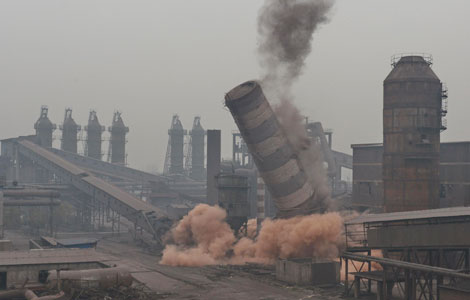
 Cutting output to help ease pollution
Cutting output to help ease pollution
 Sochi Olympic flame plunges into largest freshwater lake
Sochi Olympic flame plunges into largest freshwater lake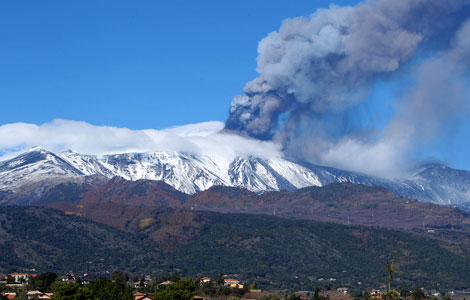
 Mount Etna erupts, lighting up Sicilian sky
Mount Etna erupts, lighting up Sicilian sky
 Deal reached in Iranian nuclear talks
Deal reached in Iranian nuclear talks
 Bitter pill for traditional Chinese medicine
Bitter pill for traditional Chinese medicine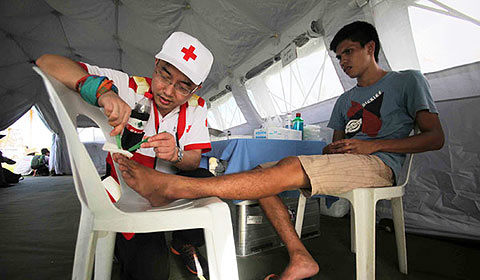
 Rescuers work in Tacloban
Rescuers work in Tacloban
 Roar of the East being heard
Roar of the East being heard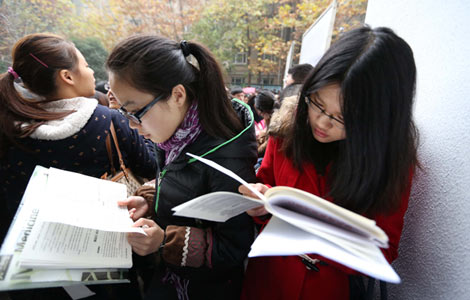
 1.12m seek government jobs
1.12m seek government jobs
Most Viewed
Editor's Picks

|

|

|

|

|

|
Today's Top News
Creating the next Asian global name
Deal reached in Iranian nuclear talks
Getting to know Tianjin
Pactera regains some momentum
Tricky Business: Catering to Chinese viewers is Hollywood hurdle
Roar of the East being heard
Xi urges safety check after blasts
Qingdao continues recovery
US Weekly

|

|



